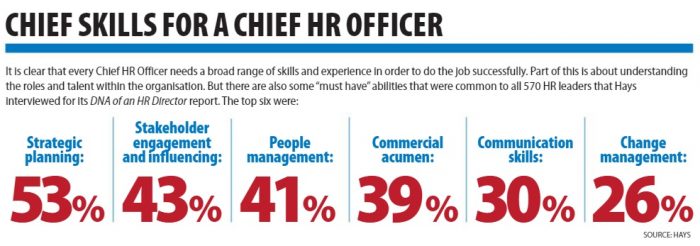Up to the challenge? The role of the Chief HR Officer

Disruption is more than just a buzzword in business circles these days. The changes taking place across multiple industries with new entrants, new business models, and new consumer demands have forced organisations to carefully analyse their own processes to find new ways of achieving their business objectives.
It is into this complex and volatile environment that HR leaders have perhaps one of their biggest opportunities to add real and sustained value to their businesses.
It is, after all, generally accepted that the biggest source of new margin and competitive advantage today comes from an organisation’s own workforce. Technical skills, creativity, and innovation are all what makes the difference between business success and underwhelming performance today.
In Asia, the choice is even starker. HR teams are responsible for attracting and retaining that all-important talent, developing it, and building cultures that allow those staff to continually perform at their most innovative best. They are required to balance the competing demands of staff and the business, and they must do it all within the confines of shrinking budgets and competing agendas.
It is clear that HR leaders in Asia have a unique opportunity right now. But as every good HR professional will know, opportunity alone is not enough to make an impact. Skills, resources, and motivation are also vital parts of the puzzle.
The question therefore becomes: Do HR leaders in this region have the skills, resources, and power to do what needs to be done? Can local Chief HR Officers here in Asia rise up to the challenge?
Diverse professional backgrounds
Recruitment firm Hays has looked closely at the typical career path of HR leaders in Asia, and found they come from a wide variety of educational and work experience backgrounds. Only 16% of the 570 HR heads that were interviewed for its DNA of an HR Director report studied HR specifically for their first degree. More than half had worked outside of HR for at least part of their professional career.
They still come with some solid experience in the field. Some 86% of the respondents in the Hays research had over 10 years of experience in HR-specific roles, prior to first wearing their Chief HR Officer hat. Indeed, 24% of them had been working in the profession for 20 or more years.
Most had worked for multiple organisations throughout their HR careers, with only 12% having been a one-company player throughout their career.
That breadth and depth of experience has helped Chief HR Officers to be prepared changes when they came, and for the rapid transformation now taking over many traditional industries. They say it has also helped them to build up the very broad and wide-ranging skill set they need to be successful at the top of the HR function within their organisations.
The skills that matter
So what skills are required to make a successful Chief HR Officer? According to Hays, they are many and varied – but overwhelmingly “soft” and people-focused. Its researchers asked HR leaders to list the top skills they used in their day-to-day work, with Strategic Planning up-voted as the clear priority. Stakeholder engagement and influencing abilities were also considered vital, with, People Management skills perhaps not surprisingly rounding out the top three.
Commercial acumen, broader communication skills, and change management skills were also listed among the top responses, creating a clear distinction between the hard HR skills learned at university, and the ability to focus those skills on real-world business problems.
“To be a great HR professional, you need to understand the business you support,” Wendy Montgomery, Head of HR for Asia-Pacific at Red Hat, says. “It’s not enough to just be a specialist in HR. (You) must know how each of the different departments supports the business.”
“You must (be able to) effectively convey the messages of what the organisation is thinking and how you can communicate those thoughts to the employees,” he says. “You have to know how to gain consensus from both parties.”
Umar further says it often falls on HR leaders to inspire their organisations across multiple teams. And this requires an overwhelmingly positive attitude and focus from Day One.
Digital skills, or at least an understanding of the way digital technologies are impacting business and organisations, are another key subset of aptitudes for HR leaders to be across.
Gaurav Hirey, Group Director of HR and Talent Development at Teledirect Telecommerce, says this is being driven by the wider workforce of today, dominated by the so-called “digital natives” of Generation Y.
“We have all these tools right now to ensure that employees are able to access anything that they need – not just online, but also on their mobile phones because that’s the way they prefer interacting,” he tells HRM Magazine Asia.
Of course, technological advances shouldn’t be taken on just for their own sake. Hirey says it needs to be about adding to the employee experience.
“When we talk about employee experience, it’s not just about providing tools and technology for our employees to communicate and work efficiently – in the way they want to,” he says. “It’s also about giving them a meaning and purpose to what they do.”
The most important resource
It’s not just all of these skills however. The majority of Chief HR Officers that HRM Magazine Asia spoke to overwhelmingly acknowledged there were other key drivers of success for the role. Tangible resources, including financial budget and talent dedicated to HR itself, are also vital. But most important of all is a high level of buy-in from the organisation’s management, and indeed the other functions and business units within it.
Without this, HR initiatives all too easily become bogged down in bureaucracy, or struggle to get approval in the first instance.
This is perhaps why the ability to influence rates so highly among the required attributes of a senior HR leader – some 43% of the Hays’ respondents placed it in the top three skills necessary of a Chief HR Officer.
The research also asked HR leaders to name the biggest challenges they had faced in their careers to date. “Organisational politics”, which typically places the HR function at a lower rung to more established teams such as finance and marketing, was indicated as an impediment to 44% of the survey’s respondents.
Xiaoguang Sun, Vice President of HR with the Alibaba Entertainment Group, says it can be a long and difficult road to change those perceptions around, but an absolutely essential journey nonetheless. He says HR leaders need to have the courage of their calling and convictions in order to win management and the rest of the organisation over: both to the fundamental demands of the HR function, and to the individual aspirations of the HR leader in question.
“A Chief HR Officer should have the courage to make a decision, even though it may not be popular or well-received by those in the organisation,” he told Hays. “If your character is one that wishes to appease everyone around you, you will not (be able) to make changes.”
More work to do
It is fair to say that the vast majority of people holding a Chief HR Officer role or its equivalent do indeed have the skills, resources, and management buy-in to do the job successfully. The problem is that there are still many organisations where the top of the HR tree brings those leaders eye-to-eye with senior managers of other functions; not the C-Suite.
Particularly in Asia, that traditional mindset – where HR is a purely transactional function – remains pervasive. Mike Bokina, the Singapore-based Global Head of HR Organisational Effectiveness with Siemens, says the ability to break down that sort of thinking will become vital for organisations still in that frame of mind as Industry 4.0 takes hold.
“We are catching up a bit as a function,” Bokina admits in a recent episode of HRM Asia’s HR in Focus. “We need to speed up that catch-up; and then refocus ourselves externally (instead of being focused on ourselves).”
“There is a lot of opportunity for HR in Asia,” he continued. “I do think the embracing of the more agile world is really critical, and that’s probably a bit of a gap (for at the moment).
“We, as HR practitioners, have to help push the human capital side of the arguments.”




